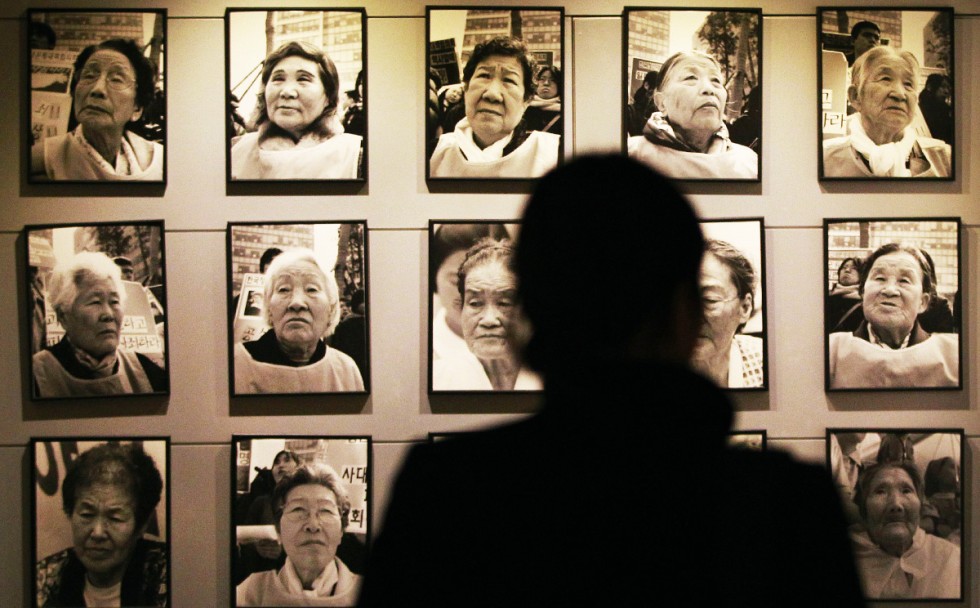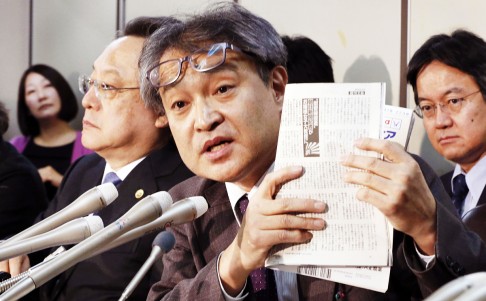10,000 people sue Japanese newspaper over stories on wartime comfort women
PUBLISHED : Tuesday, 27 January, 2015, 3:22pm
UPDATED : Tuesday, 27 January, 2015, 6:38pm
Agence France-Presse in Tokyo

A visitor at a 2014 war exhibit looks at portraits of late former comfort women who were forced to serve for the Japanese troops as a sexual slaves. Photo: AP
More than 10,000 people are suing Japan’s leading liberal newspaper over stories on Tokyo’s system of wartime sex slavery, which they say have stained their reputation as Japanese nationals.
The move is the latest salvo in the battle over Japan’s history, which pits an increasingly aggressive revisionist right wing against an ever-more cowed mainstream that accepts the country’s guilt over second world war atrocities.
The group of plaintiffs, led by Sophia University professor emeritus Shoichi Watanabe, is demanding 10,000 yen (HK$656) in apparently symbolic compensation each, describing themselves as “Japanese citizens whose honour and credibility were damaged by the false reports made by the Asahi Shimbun”, according to court documents.
They argue that Asahi reports on the so-called “comfort women” system “have imposed indescribable humiliation not only on former soldiers but also on honourable Japanese citizens ... who are labelled as descendents of gang rapists”.
Despite a dearth of official records, mainstream historians say up to 200,000 women, many from Korea but also from mainland China, Indonesia, the Philippines and Taiwan, served Japanese soldiers in military brothels called “comfort stations”.
Most agree that these women were not willing participants and that the Imperial Japanese Army and wartime government were involved in their enslavement, tacitly or explicitly.
Right-wingers, however, say the women were common prostitutes engaged in a commercial exchange, and are fighting a vigorous rear-guard battle to alter the narrative.

Takashi Uemura, a former Asahi Shimbun newspaper reporter, speaks to the press on January 9 about receiving threats after publishing stories on a Korean "comfort woman". The newspaper is now the subject of a lawsuit from disgruntled Japanese who deny the atrocities occurred. Photo: Kyod
The Asahi Shimbun has become the focus of their ire because it published a series of articles in the 1980s based on the now-discredited testimony of a Japanese man who said he had rounded up Korean women to work in military brothels.
After years of pressure, the paper retracted the articles, and apologised. The company’s president also resigned.
Conservatives leapt on the Asahi’s climbdown, and nationalist Prime Minister Shinzo Abe, who wants a more sympathetic telling of Japan’s history, took the move as proof of a smear.
“In the postwar period, the Asahi Shimbun has consistently been haunted by socialistic fantasies, infected by anti-Japanese, self-degrading ideologies,” the lawsuit alleges.
The paper “never hesitated to humiliate (the men) who so selflessly staked their lives for Japan’s independence and modernisation.
“The Japanese military complied with international law and maintained high moral standards, with the world’s strictest military discipline,” the document says.
Revisionists typically do not believe the well-documented Rape of Nanking, in which tens of thousands of Chinese died in a six-week orgy of rape and violence when the Japanese Imperial Army over-ran China’s then-capital in 1937.
Nor do they accept that their military carried out experiments, including vivisection, on live prisoners in China.
The Asahi said it would study the court document before responding.
